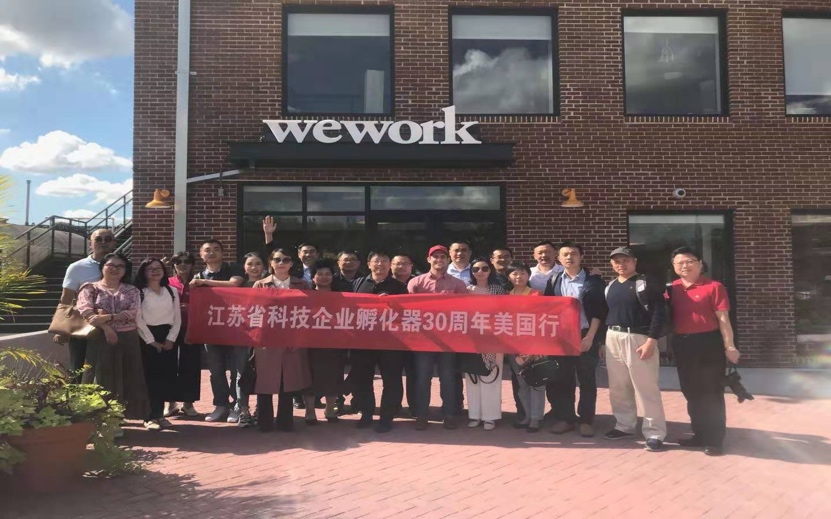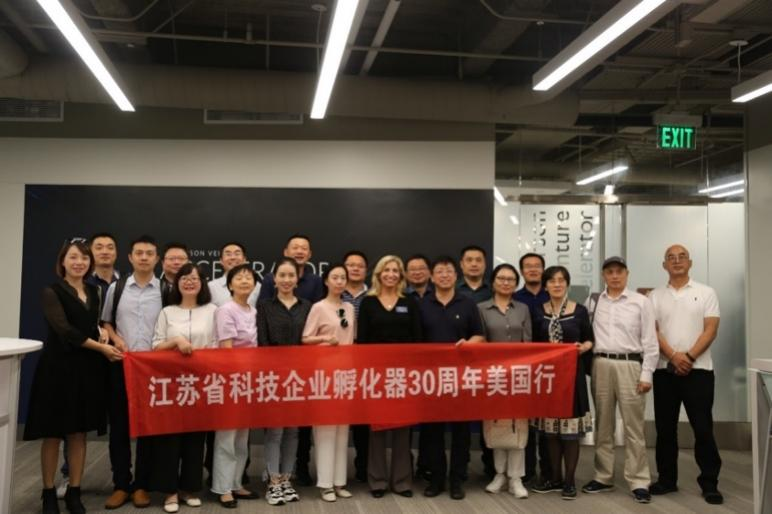| Position: Home > News Center > Company News |
| Study tour to USA to Explore Innovation carriers (September 2019) |
| Publish Time:2023-08-01 |
|
In Sep.2019, the Jiangsu Association for International Science and Technology Cooperation(JAISTC) organized a delegation of leaders from various technology parks, incubators, and technology service institutions in Jiangsu to visit the United States, including New York and Silicon Valley, for a study and exploration trip. 1.Visited Institutions and Contents: (1)Eugene Lang Entrepreneurship Center: An important entrepreneurship service incubator at Columbia University, offering entrepreneurship-related elective courses for students from the business school and other departments. It also involves students in practical entrepreneurial activities, with guidance and feedback provided by distinguished alumni, successful entrepreneurs, legal experts, and public relations specialists acting as entrepreneurial mentors. (2)Joynture Co-Working Space: Founded by a Pakistani-American, located in a prime location about 300 meters east of the New York Stock Exchange. This co-working space emphasizes personal privacy and conducts expert interviews and screenings for potential projects. It focuses on combining startups with established enterprises to facilitate mutual learning and progress. (3) Maryland Technology Enterprise Institute: This institution comprises an incubator and an accelerator. The incubator is located within the University of Maryland, and the accelerator is nearby to cater to larger space requirements. Under the Engineering College, its main services include entrepreneurship training, business incubation, and enterprise acceleration. Funding comes from various sources such as subsidies from the Maryland government, university funding, and donations. Its services target students, community members, employees, and international students at the University of Maryland.
WEWORK maker space in DC (4) Wework Space: Established in 2011, Wework has 54 shared office spaces globally, spanning countries like the United States, China, the UK, the Netherlands, and locations in Israel such as Tel Aviv and Herzliya. Among its 30,000 clients, there are both startups and large enterprises like Merck and American Express. Wework's incubation model primarily involves conducting seminars, where professionals from various fields, including government, business, and law, are invited for entrepreneurial discussions. Even Vice Presidents of USA have participated in these seminars. (5)Plug and Play Incubator: Plug and Play is a globally renowned investment-focused incubator that has incubated over two thousand companies, accelerating an average of 1,030 startups each year, including high-value companies like Google, Dropbox, Paypal, and Logitech. It operates branches in 26 cities across 11 countries, and one of its distinctive features is serving both small and large enterprises. It directly connects startups' ideas with the demands of larger enterprises, providing tailor-made solutions for them. (6)San Jose State University Silicon Valley Innovation Center: Affiliated with San Jose State University, this center offers innovation and entrepreneurship courses for its students. In addition to in-house professors, it invites external entrepreneurs, venture capitalists, lawyers, and government officials to give lectures. The center also organizes student participation in entrepreneurship competitions held in various locations. Winners receive not only prizes but also free access to Plug and Play's co-working spaces. (7)UCLA Anderson Accelerator: This accelerator was established in 2016 and is located in the basement of the original library. Although named an accelerator, it primarily serves as a co-working space for campus-based startup teams. The Los Angeles area is one of the fastest-growing regions for innovation and venture capital in the United States and is often referred to as Silicon Beach due to its proximity to Santa Monica Beach. (8)One Piece Work Co-Working Space: Co-founded by the globally renowned investor, Guo Wei, One Piece Work's investment partner, UpHonest Capital, has invested in nearly 300 companies since its inception, with six of them quickly becoming unicorns. These unicorns include Scout (listed in Australia), Chariot (acquired by Ford), Worklife (acquired by Cisco), Virtroid (acquired by Magic Leap), Native (acquired by Procter & Gamble), and TBH (acquired by Facebook). One Piece Work has dozens of branches in ten cities, including Silicon Valley, San Francisco, Los Angeles, Seattle, and Boston. 2.Gained Insights: The visited incubators and innovation centers can be roughly divided into several categories: privately-funded incubators operated by capital investments, non-profit incubators established by public universities, and those emphasizing technological development with overseas research centers, such as Joynture Co-Working Space. Through these visits and exchanges, the delegation gained the following insights: Anderson Accelerator in UCLA (1)Importance of Capital Investment in Startups: Both privately-funded incubators like Plug and Play and non-profit ones like Maryland Technology Enterprise Institute place great emphasis on investing in startups. For instance, "shoof" company received angel funding through Plug and Play's recommendation, enabling them to focus on perfecting their technology instead of launching an imperfect version into the market. In contrast, some investment institutions in China tend to focus on mid to later-stage investments, hesitating or refraining from investing in startups that urgently need funds. (2)Emphasis on Connections with Large Enterprises: Institutions like Plug and Play connect startups directly with the demands of larger enterprises, guiding their technological innovations to tailor solutions for these enterprises. Similarly, the Maryland Technology Enterprise Institute encourages entrepreneurs to apply market-unpopular technologies in more promising fields. For example, a delayed solidifier additive that paint companies dislike might find success in anti-congealing viscous beverage applications.
(3)Thinking highly of Value-Added Services Beyond Renting Spaces: In the United States, government support for incubator construction is lacking. Among the incubators visited, university-based entrepreneurship incubators provide almost rent-free spaces. Their value-added services are carried out through elective courses and regular training in entrepreneurship. Private enterprises establishing incubators not only generate income from rent but also prioritize investment returns and membership fees. Plug and Play charges membership fees directly to large enterprises for connecting them with startups. In contrast, the survival and development of Chinese incubators heavily rely on rent and government funding. (4)Cultivating Entrepreneurial Spirit: The visited university-based entrepreneurship centers offer entrepreneurship courses as electives that count toward students' credits. At some business schools, these courses are compulsory. For instance, Jeremy Kagan, the head of the Eugene Lang Entrepreneurship Center, has experience in three startups and proudly claims that his failures serve as valuable guidance for his students on how to succeed. As he puts it, "sometimes failure is a form of success." (5)Focus on Business Model Innovation: Visited institutions included technology innovation centers represented by the Maryland Technology Enterprise Institute and those relying on technology but emphasizing commercial value, such as the Eugene Lang Entrepreneurship Center and UCLA Anderson Accelerator. The latter centers practically apply high-end technology to everyday life. They often categorize their entrepreneurial mentors into two types: research-oriented mentors who focus on technology and business-oriented mentors who hold external positions. This allows them to provide guidance that better fits the development of startups. |

